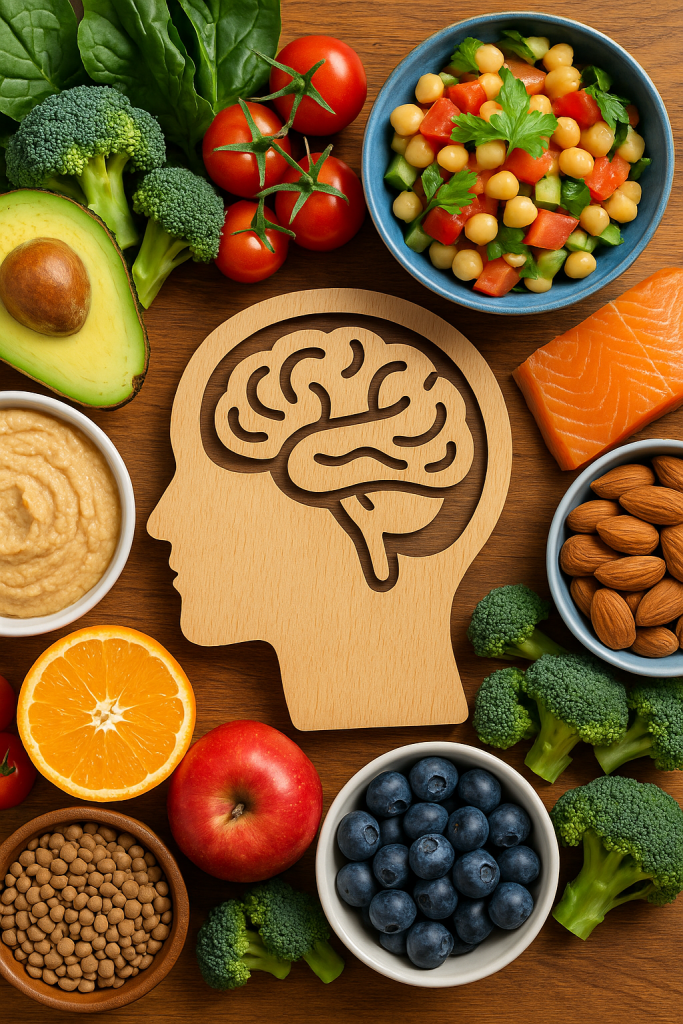It’s becoming harder to ignore: what you eat isn’t just about your waistline or energy levels. It’s also about your brain. The conversation around nutrition and mental health is gaining serious traction, and it’s no longer a fringe idea. From researchers to psychiatrists, more professionals are pointing to one clear connection: your gut and your brain are in constant communication. Discover the the link between nutrition and mental health.

Why Nutrition and Mental Health Are Being Studied Together
In the last decade, science has started catching up with what many cultures have known for centuries: food affects mood. With anxiety, depression, and burnout rising globally, experts are digging into the underlying causes, and one al functions. It’s like a WhatsApp group between your microbiome and your mental state. And when your gut microbiota is in chaos (thanks to processed food, sugar overload, and poor diet), your mental well-being often takes a hit.
A 2021 review published in Nutrients found consistent links between poor-quality diets and a higher risk of mental disorders, particularly depression and anxiety.
Current Trend: Nutritional Psychiatry
One of the hottest fields in this space right now is nutritional psychiatry. It’s exactly what it sounds like: a focus on how dietary choices influence mental health. This isn’t just about eating an apple and hoping for inner peace. It’s about strategic nutritional interventions that target brain function and emotional regulation.
Psychiatrists like Dr. Drew Ramsey are pioneering this movement, using food as part of treatment protocols for mood disorders. His work, including the book Eat to Beat Depression and Anxiety, highlights how micronutrients can shape neurotransmitters like serotonin and dopamine, which influence mood and cognitive clarity.
The Gut-Brain Axis: A Quick Breakdown
To understand why nutrition and mental health are so tightly linked, it helps to know how the gut-brain axis works:
- Microbiome messaging: The trillions of bacteria in your gut send chemical messages to your brain.
- Inflammation triggers: A poor diet can inflame the gut, which in turn increases neuroinflammation (inflammation in the brain).
- Nutrient availability: The brain needs key nutrients like Omega-3s, B vitamins, zinc, magnesium, and amino acids to function well. Deficiencies mess with this balance.
Research published in The Lancet Psychiatry backs this up, suggesting that addressing diet should be a standard part of mental health care.
Foods That Support Mental Health
So, what foods actually support better mental health? Here are some research-backed options:
1. Fatty Fish
Loaded with Omega-3 fatty acids, which play a crucial role in brain structure and function.
2. Leafy Greens
Packed with folate, iron, and magnesium—nutrients linked to mood regulation.
3. Fermented Foods
Think yogurt, kefir, kimchi. They support a healthy gut microbiome, which in turn supports stable mood and lower anxiety.
4. Whole Grains
Provide slow-release energy and help regulate blood sugar, which affects mood stability.
5. Nuts and Seeds
Rich in tryptophan (a precursor to serotonin), magnesium, and healthy fats.
Mental Health Red Flags in Diet
On the flip side, here are dietary patterns that can aggravate mental health issues:
- High-sugar diets: Can lead to mood crashes and increase inflammation.
- Processed foods: Often low in nutrients and high in preservatives and additives.
- Alcohol and caffeine overload: These can overstimulate the nervous system and mess with sleep.
How to Improve Your Diet for Mental Wellness
Improving your diet for your mental health doesn’t mean turning into a health guru overnight. Here’s a simple, doable roadmap:
1. Keep a Mood & Food Journal
Track how you feel after eating certain foods. Patterns will emerge.
2. Focus on Diversity
Eat a wide range of plant-based and whole foods. Your microbiome loves variety.
3. Add, Don’t Subtract
Instead of obsessing over cutting things out, start by adding brain-supporting foods.
4. Hydrate Better
Even mild dehydration can cause fatigue and irritability. Up your water intake.
5. Consult a Professional
See a dietitian or a nutritional psychiatrist if you suspect your mood is food-related.
What the Experts Are Saying
- The American Psychological Association has noted a growing body of evidence connecting poor diet with a range of mental health conditions.
- A 2020 study in Frontiers in Psychology confirmed that diet quality has a significant association with mental health outcomes in both adolescents and adults.
Final Thoughts
It might feel easier to reach for coffee when you’re anxious or snack when you’re stressed, but your brain is literally shaped by what you feed it. Nutrition and mental health are more interconnected than we ever imagined, and understanding this link could change how we approach emotional well-being.
Whether you’re struggling with mental health challenges or just trying to feel more balanced day-to-day, it’s worth taking a closer look at your plate. Your brain is listening to your gut—quite literally.
References
O’Neil et al. (2020), Nutritional Psychiatry: Your Brain on Food – https://www.health.harvard.edu/blog/nutritional-psychiatry-your-brain-on-food-201511168626
Jacka et al. (2019), Nutritional psychiatry: Towards improving mental health by what you eat – https://www.sciencedirect.com/science/article/pii/S0924977X19317237
Firth et al. (2020), Food and mood: how do diet and nutrition affect mental wellbeing? – https://www.ncbi.nlm.nih.gov/pmc/articles/PMC7322666/






